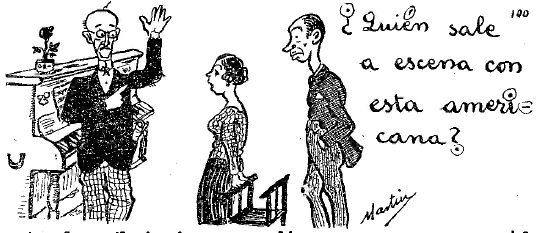
| Языки :: Испанский |
| Аудио |
 |
|
|
303 |
Español |
Spanish |
|
Lección Ciento (100) |
||
| Noche de estreno (fin) | First night (the end). | |
| 1 |
Fab. — ¡Me juego el macferlán a que te llaman en el dúo
(1)! Lau. — Sí, pero el número más bonito es el de "Las cuatro estaciones"... ¿Quién hace el otoño, papá? Mel. — La Pérez. Lau. — ¡Ay, estará guapísima! |
I bet my Inverness cape that they call you to the stage upon the scene
of the duo! — Laura. — Yes, but the nicest number is that of the "four seasons". Who acts Autumn, dad? — Don M. — (It is Madame) Perez. — Lau. — Oh! she will be topping [very nice]. |
| 2 |
Mel. — Guapísima! Es una mujer que... ¡Tiene un juego de caderas tan teatral!... ¿Y donde me dejáis a las coristas, vestidas... bueno, sí... vestidas de brisas otoñales? |
Mel. — Topping! She's a woman who... She has so theatrical a hip-play.
And what do you say [where do you leave] of the chorus-girls, dressed as... well, yes... dressed in autumnal breezes? |
| 3 |
¡Mira que la entrada de los violines cuando salen ellas (2) !
(tarareando) Tararí... tararó... tararírorí... pues ¿y el efecto que les saco a las flautas al empezar la caída de la hoja? Fab.— ¡Oh! |
You must see [notice that] the coming in of the violins when they
enter [the scene]; (hums); diddle diddle dee. Well what about [and] the effect I draw from the flutes when begins [at beginning] the fall of the leaves? — Fab. — Oh! |
| 4 |
Lau. — ¡Qué lástima, papá, que no puedas presenciar tu triunfo
(3) ! Mel. — ¡Qué quieres, hija! Me ha faltado valor... y sobre todo ¿quién sale a escena con esta americana?... Pero, esta noche se acaban los apuros! Aunque el libro sea un adefesio y la música otro, la obra se aplaude (4). |
Lau. — What a pity, dad, that you cannot be-present at your triumph! — Mel. — What could I say [do you want (me to say)], my daughter! My courage failed me... And above all, who would appear on the stage with this coat? But to night our troubles end ! Even if the libretto is an idiocy, and the music another, the work will be [is] applauded. |
| 5 |
Fab. — ¿Qué me cuentas? Mel. — ¿No os he dicho el reparto de localidades que he hecho? Lau. — No. |
Fab. — What do you tell me? — Mel. — Have I not told you the distribution of seats that I have made? — Lau. — No, |
| 6 |
Mel. — ¡Pues es peregrino! El bueno de Bernabé las ha llevado todas. Mira : el sastre está en butaca de orquesta; el sombrero, en la primera fila de las otras; el zapatero, en la segunda. |
Mel. — Well, it's marvellous! This good Barnaby has distributed [carried] them all... Mind [Notice]... : the tailor is at an orchestra stall; the hatter in the first row of the others; the cobbler in the second row; |
| 7 |
El amo de la casa, en un palco de entresuelo; el panadero, en una principal; el de la tienda, en delantera de anfiteatro; el del carbón, en el paraíso; el de las verduras... (5). |
the landlord in a ground-floor box; the baker in a first box; the grocer in the first gallery; the coal-seller at the gods; the greengrocer... |
| 8 |
Fab. — Bueno, así todos ellos... Mel. — ¡Todos ellos! Y el que más y el que menos sabe que si hay silba no cobra ¡Con que figuraos la ovación (6)! Es lo que me decía Bernabé; que grite uno junto al del carbón... ¡y ya verá usted la leña! Fab. — Hay que reírse. |
Fab. — Good, and [they too] all like that... — Mel. — All! and all more or less [who more and who less] know that if the play is hissed [if there is hissing], he does not receive any [thing] (money). Consequently, fancy what cheers! That's what B. was telling me ; let somebody shout near the coal-seller; you'll see some thrashing! [wood]. — Fab. : Let me laugh! [there is something to laugh at]. |
| (La Vida íntima, by Serafín and Joaquín Alvarez Quintero.) |
| EJERCICIOS | EXERCISE : | |
| En la sastrería. |
At the tailor's shop. |
|
| 1 |
¿Viene usted a probar su traje? Muy bien; siéntese un ratito, el dependiente lo va a traer ahora mismo... |
You come to try on your suit? Very well; sit down a little while, the apprentice is going to bring it presently. |
| 2 |
Entre aquí y ponga primero el pantalón... Este año se llevan los pantalones algo anchos de piernas... ¿No le aprieta en la cintura?.. ¿Lleva usted tirantes?... |
Go in here, and put on the trousers first. This year, people wear trousers a little wide [of leg]. It is not too tight [does not press you] at the waist? (Do) you wear braces... |
| 3 |
A ver el chaleco; mírese en esta luna. Me parece que no hay nada que retocar. ¿Lo quiere usted un poco más escotado?... |
Let's see the waistcoat... look at yourself in that mirror. It seems to me that there is nothing to touch up. You want it a little more open? |
| 4 |
La chaqueta le cae muy bien en los hombros y en la
espalda, pero está un poco holgada en el talle; la apretaremos un poquito... |
The coat hangs very well, at the shoulders and in the back, but it is a little too loose at the waist, we shall tighten it a little. |
| 5 |
Las mangas están bien... ¿Lleva usted siempre puños almidonados?... bueno, entonces las dejaremos un centímetro más anchas... |
The sleeves fit well. You always wear starched cuffs? Right, we'll make [leave] them one centimeter wider. |
| 6 |
En la delantera pondré dos botones nada más; ya están hechos los ojales; pero si usted desea botones de otra clase o de otro color... |
On the front I shall put two buttons [nothing more] only; the buttonholes are already made, but if you desire buttons of another sort or another colour? |
| 7 |
¿Otro bolsillo interior, dice usted? Pues estamos a tiempo todavía... |
Another inside pocket, do you say? Well, we are still in time. |
| 8 |
Ha de quedar muy satisfecho de este traje : el paño es de excelente cualidad... Se fijará usted que también le he puesto un buen forro que no ha de encogerse al lavado. |
You'll be very satisfied with this suit; the material is of an excellent quality. You will observe that I have put in good lining, that will not shrink when washed [at washing]. |
| NOTES. | |
| 1 |
Me juego el macferlán, lit. : I play me the Inverness cape,
I bet my I. c.;
|
| 2 |
When the stage is concerned, salir means for us not
to go out (exit, exeunt)
but to enter. |
| 3 |
Presenciar (not followed by the prepos. a), to attend.
Presenciar un espectáculo. |
| 4 |
Aunque el libro sea. According as it is followed by the indicative or the subjunctive, the conjunction aunque, just as though or although in English expresses two distinct ideas : Aunque el libro es (indic.) idiota : although the book is stupid (you admit that it is); aunque el libro sea idiota (subj.) : though (=even though) the book be stupid (it is only a supposition). |
| 5 | El paraíso, paradise, is in theatre language the gods; in Spanish, you also say el gallinero, |
| 6 |
Con que, so, accordingly (see note 5 of previous lesson).
— Leña, firewood, as opposed to madera, timber. Dar leña, to give a thrashing, like : dar palos or dar una paliza. |
|
la joyería, the shop of the jeweller (joyero); relojería, of the watchmaker (relojero); tintorería : of the dyer (tintorero), etc. In the text above, which should be a dialogue, we have left out the customer's answers. It would be an excellent exercise for you to find out these replies, as you read the text again : Ex. : Si, señor, vengo a probar... Muchas gracias, no tengo prisa (I'm not in a hurry)... Me gustan los pantalones anchos...; no señor, no me aprieta, etc. |
|
|
Probar (pruebo, Vd. prueba), to try,
when speaking of clothes. We have already found it with the meaning of to taste (food). "Ensayar", that looks like the English to assay, means to rehearse a play, song or dance etc.; el ensayo general : dress rehearsal (S. Noche de Estreno, end of 1st part). To repeat, say again is : repetir (yo repito, Vd. repite, repetimos). — La sastrería, the shop of the tailor (sastre). So : la zapatería, the shop of the cobbler (zapatero); la sombrerería, the shop of the hatter (sombrerero); la camisería, the shop of the shirt-maker (camisero); |
